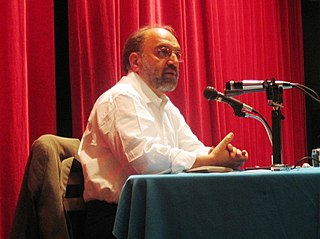A Quote by Albert Einstein
Don't think about why you question, simply don't stop questioning. Don't worry about what you can't answer, and don't try to explain what you can't know. Curiosity is its own reason. Aren't you in awe when you contemplate the mysteries of eternity, of life, of the marvelous structure behind reality? And this is the miracle of the human mind - to use its constructions, concepts, and formulas as tools to explain what man sees, feels and touches. Try to comprehend a little more each day. Have holy curiosity.
Quote Topics
Related Quotes
The important thing is not to stop questioning. Curiosity has its own reason for existing. One cannot help but be in awe when he contemplates the mysteries of eternity, of life, of the marvelous structure of reality. It is enough if one tries merely to comprehend a little of this mystery every day. Never lose a holy curiosity.
I try to communicate with the musicians the way I communicate with the filmmakers. I'm not going to say to them, can we be a little bit more presto here. Hang on, this should be a bit more exciting, or I try to explain the scene to them, or I try to explain the context the notes are supposed to live in.
Why does philosophy use concepts and why does faith use symbols if both try to express the same ultimate? The answer, of course, is that the relation to the ultimate is not the same in each case. The philosophical relation is in principle a detached description of the basic structure in which the ultimate manifests itself. The relation of faith is in principle an involved expression of concern about the meaning of the ultimate for the faithful.
It's obvious that I must explain what I want from an actor, but I don't want to discuss everything I ask him to do, because often my requests are completely instinctive and there are things I can't explain. It's like painting: You don't know why you use pink instead of blue. You simply feel that's how it should be - pink. Then the phone rings and you answer it. When you come back, you don't want pink anymore and you use blue - without knowing why. You can't help it; that's just the way it is.
How do we regulate our emotions? The answer is surprisingly simple: by thinking about them. The prefrontal cortex allows each of us to contemplate his or her own mind, a talent psychologists call metacognition. We know when we are angry; every emotional state comes with self-awareness attached, so that an individual can try to figure out why he's feeling what he's feeling. If the particular feeling makes no sense—if the amygdala is simply responding to a loss frame, for example—then it can be discounted. The prefrontal cortex can deliberately choose to ignore the emotional brain.
I had an indefatigable curiosity about everything. But why should my fate have depended upon that? Why does the curiosity of a child born into the lowest classes have to overcome everything put in his or her way to mute that curiosity, when a child born to parents with access to the advantages of life will have his meager curiosity kindled and nurtured? The unfairness is horrifying when it is properly understood as an unfairness meted out on children, on infants, on babies.
































